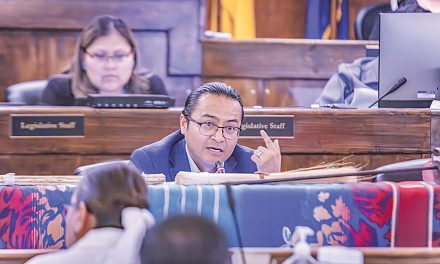
Biden’s budget request ‘historic,’ key congressman says
WASHINGTON
The Biden-Harris administration on Monday submitted to Congress its budget request for fiscal year 2023 and advocates for tribes hailed its continuing outpouring of federal aid.
For Indian affairs programs, the request is $4.5 billion, an increase of $1 billion over the FY 2022 continuing resolution level.
This includes $2.8 billion for the Bureau of Indian Affairs, $1.6 billion for the Bureau of Indian Education, and $112.7 million for the Bureau of Trust Funds Administration.
U.S. Sen. Brian Schatz, D-Hawai‘i, chairman of the Senate Committee on Indian Affairs, said, “President Biden’s budget request is historic.
“It proposes big increases for critical Native programs and reflects the administration’s strong commitment to continue fulfilling the federal government’s trust responsibility to tribes and Native communities,” Schatz said.
“While we’ve already secured record levels of federal funding in the last two years,” he said, “I look forward to working with the president as we move forward with the appropriations process to help provide even more federal resources to Native communities.”
Deb Haaland, secretary of Interior, said, “These resources, coupled with the historic Bipartisan Infrastructure Law, will help the department make critical investments in climate resiliency while creating good-paying union jobs in the clean energy economy, ensuring tribal communities have the resources and support they need and conserving and protecting wildlife and their habitats for future generations.”
Bryan Newland, assistant secretary-Indian affairs, said, “The president’s budget demonstrates his commitment to working with tribal leaders to make their communities safer by increasing numbers of law enforcement officers, repairing detention facilities, preventing crime through community wellness strategies, and supporting victims.”
The budget supports an all-of-government approach to federal responsibilities and tribal needs, says a DOI news release.
Indian affairs play an essential role in carrying out the federal trust responsibility by providing services to 574 federally recognized American Indian and Alaska Native Tribes in Alaska and the contiguous 48 states.
Highlights in budget request
Some highlights for Native communities in Biden’s fiscal 2023 budget include:
- $156 million increase to support construction work at seven Bureau of Indian Education schools, $7 million for the Federal Boarding School Initiative, $37.4 million Native Hawaiian Education, and $25 million to strengthen Alaska Native and Native Hawaiian-Serving Institutions.
- $632 million in Tribal Public Safety and Justice funding at the Department of the Interior, which collaborates closely with the Department of Justice on continued efforts to address the crisis of Missing and Murdered Indigenous Persons.
- $20.2 billion for HHS’s early care and education programs, an increase of $3.3 billion over the 2021 enacted level. This includes $7.6 billion for the Child Care and Development Block Grant to expand access to quality, affordable child care for families.
- $673 million in tribal climate funding and $150 million to electrify tribal homes and transition tribal colleges and universities to renewable energy.
- Mandatory funding to the Bureau of Reclamation for operation and maintenance of previously enacted Indian Water Rights Settlements.
- $1 billion in HUD to fund Native communities’ efforts to expand affordable housing, improve housing conditions and infrastructure, and increase economic opportunities for low-income families.
- $752 million over the 2021 enacted level for tribal colleges and universities, historically Black colleges and universities, minority-serving institutions, and low-resourced institutions such as community colleges. This funding includes $450 million in four-year HBCUs, TCUs, and MSIs to expand research and development infrastructure.
- $600 million for the USDA ReConnect program, which provides grants and loans to deploy broadband to unserved rural areas – especially tribal areas – and $25 million to help rural telecommunications cooperatives refinance their Rural Utilities Service debt and upgrade their broadband facilities.
- $62 million for agriculture research, education, extension grants to tribal institutions, and $7 million to support tribal producers through the Inter-Tribal Assistance Network.
- $35 million for culturally-specific Violence Against Women Act program services, $10 million for underserved populations, $5.5 million to assist enforcement of tribal special domestic violence jurisdiction and $3 million to support tribal special assistant U.S. Attorneys. And an additional $69 million to the FBI for violent crimes against children in Indian Country.
IHS boss hails mandatory funding
Elizabeth Fowler, acting director of the Indian Health Service, hailed President Joe Biden’s fiscal 2023 budget request for making IHS funding mandatory.
“The (president’s budget) proposes the first-ever fully mandatory budget for the IHS,” Fowler said. “This proposal is a historic step forward toward securing adequate, stable, and predictable funding to improve the overall health status of American Indians and Alaska Natives.
“It also ensures we never repeat the disproportionate impacts experienced during the pandemic,” she said.
The budget proposes to authorize and appropriate funding for IHS for 10 years, from fiscal 2023 to fiscal 2032.
“The budget significantly increases IHS’ funding over 10 years, makes all funding mandatory, and exempts all proposed law mandatory funding from sequestration,” Fowler said.
This “historic step” is in response to the recommendations of tribal leaders in consultation with the Department of Health and Human Services and IHS.
“In fiscal 2023, the budget includes a total of $9.3 billion in mandatory funding for IHS, which is $2.5 billion above fiscal 2022 enacted,” she said.
“In fiscal 2032, the budget culminates in a total funding level of $36.7 billion,” she said. “When compared with the fiscal 2022 enacted level of $6.8 billion, the fiscal 2032 proposed funding level represents an increase of close to $30 billion, or 442 percent over 10 years.”
Other highlights include over five years, and the budget increases by more than $11 billion to expand direct health care services.
It also includes an additional $6 billion to finalize the modernization of the IHS electronic health record system.
The budget would also fully fund the remaining projects on the 1993 Health Care Facilities Construction Priority List.
“The bold action in the fiscal 2023 president’s budget demonstrates the administration’s continued commitment to work to raise the physical, mental, social, and spiritual health of American Indians and Alaska Natives to the highest level and strengthen the nation-to-nation relationship,” Fowler said.
The office of President Jonathan Nez did not respond to an email requesting comment.








 Highway 264,
Highway 264, I-40, WB @ Winslow
I-40, WB @ Winslow